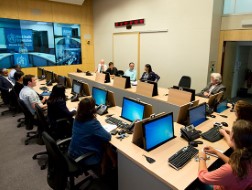Infodemic management 101
Everyone has a role in managing the infodemic, and this journey starts by understanding and identifying its key mechanisms and actors. This course is for anyone interested in understanding what an infodemic is, how it dramatically affects public health and what we can do about it now and into the future. Participants can expect to be exposed to a broad range of infodemic management skills and topics and learn the basics on how to decrease the negative impact of misinformation and disinformation on public health.
Please note: These materials were launched on 14/12/2021.
This course is also available in the following languages:
Español- العربية
Course contents
Introduction to the course:
By the end of this module, you should be able to: explain why the course was created, what are its learning objectives, and how it is organised.
Module 1: Introduction to infodemic management:
By the end of this module, you should be able to: explain what an infodemic is and why we should care; and describe why we all have a role to play in managing infodemics.
Module 2: Introduction to the science of misinformation:
By the end of this module, you should be able to: demonstrate the difference between misinformation and disinformation, identify some of the most common strategies used to spread false and misleading information; recall some of the most frequent fallacies used in COVID-19 news.
Module 3: Verification and fact checking in a health crisis:
By the end of this module, you should be able to: describe what is factchecking and who are its main actors and tools; identify misleading and verify visual content online
Module 4: Prebunking, debunking and inoculation theory:
By the end of this module, you should be able to: explain prebunking and debunking concepts; identify some prebunking and debunking techniques; describe what is the inoculation concept; and list technics to amplify credible health information.
Module 5: Interventions’ design and empowerment of communities:
By the end of this module, you should be able to: assess the impact of misinformation on trust, risk perception, behaviors, and cognition; identify some practical ways to ensure likely uptake of messages and behaviors in communities; describe methods to design multiple levels’ interventions based on specific knowledge or behavior objectives; and describe the role that community engagement can play in responding to public health crises.
Final Quiz
User Reviews
Be the first to review “Infodemic management 101”
You must be logged in to post a review.







There are no reviews yet.